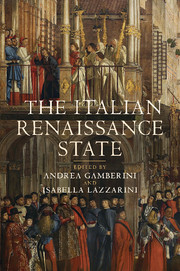Book contents
- Frontmatter
- Contents
- Notes on the contributors
- Note on translations and usage
- Map
- Introduction
- Part I The Italian states
- Part II Themes and perspectives
- 12 The collapse of city-states and the role of urban centres in the new political geography of Renaissance Italy
- 13 The rural communities
- 14 Lordships, fiefs and ‘small states’
- 15 Factions and parties: problems and perspectives
- 16 States, orders and social distinction
- 17 Women and the state
- 18 Offices and officials
- 19 Public written records
- 20 The language of politics and the process of state-building: approaches and interpretations
- 21 Renaissance diplomacy
- 22 Regional states and economic development
- 23 The papacy and the Italian states
- 24 Justice
- Bibliography
- Index
13 - The rural communities
Published online by Cambridge University Press: 05 August 2012
- Frontmatter
- Contents
- Notes on the contributors
- Note on translations and usage
- Map
- Introduction
- Part I The Italian states
- Part II Themes and perspectives
- 12 The collapse of city-states and the role of urban centres in the new political geography of Renaissance Italy
- 13 The rural communities
- 14 Lordships, fiefs and ‘small states’
- 15 Factions and parties: problems and perspectives
- 16 States, orders and social distinction
- 17 Women and the state
- 18 Offices and officials
- 19 Public written records
- 20 The language of politics and the process of state-building: approaches and interpretations
- 21 Renaissance diplomacy
- 22 Regional states and economic development
- 23 The papacy and the Italian states
- 24 Justice
- Bibliography
- Index
Summary
Historiographical considerations
Renewed interest
The interest shown by Italian historiography in the subject of rural communities has varied greatly over the past century. At the beginning of the twentieth century, rural communities became a favoured topic of research which absorbed some of the greatest historians of the time, from Gaetano Salvemini to Romolo Caggese, from Gioacchino Volpe to Gian Piero Bognetti, and became the source of animated debate between Italian and transalpine, particularly German, historiography. This debate developed into a sounding board for significant interpretations and methodological approaches. The origins of the rural communes became the prism through which historians confronted the crucial issues concerning the history of Italy, such as class conflict, relations between cities and their countryside, the combination of Roman, or pre-Roman, heritage with Germanic contributions in forming a specific national culture, and the strength with which ecclesiastical structures at a local level united groups of people settled within their territory. In the same context they also debated the relationship between sociological theory and history, between generalisations and erudite foundations of research.
In the second half of the twentieth century, interest in this topic notably diminished. Only a small number of medievalists were undertaking research into communities and their sporadic contributions were rarely central to the historiographical debate. Research into Italian rural areas privileged dynamics of possession and transformations of the countryside and settlements, leaving politico-institutional organisation in the shade.
- Type
- Chapter
- Information
- The Italian Renaissance State , pp. 261 - 283Publisher: Cambridge University PressPrint publication year: 2012
- 2
- Cited by



